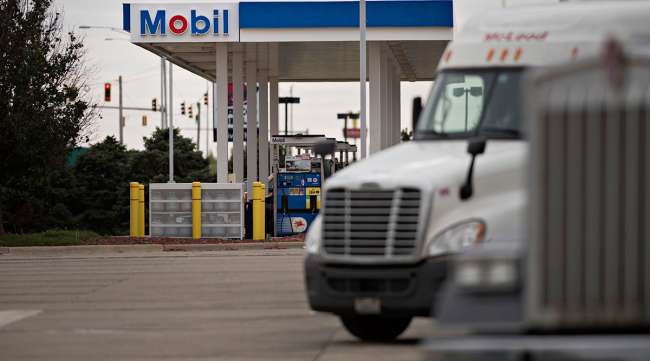Staff Reporter
Diesel Falls 1¢ to $2.394 in Fourth Consecutive Decline

[Stay on top of transportation news: Get TTNews in your inbox.]
The nationwide average price of diesel fuel fell by 1 cent, the fourth consecutive weekly decline, according to the U.S. Energy Information Administration’s report released Sept. 28.
Meanwhile, in an unusual twist, the average price of a gallon of gasoline increased by one-tenth of a cent to $2.169, despite the price falling in nine of 10 regions. The one region that saw an increase, the Midwest at 2.5 cents a gallon, was enough to swing the overall national price into upward territory. Gasoline costs 47.3 cents per gallon less than it did a year ago.
At $2.394 a gallon, diesel — trucking’s main fuel — costs 67.2 cents a gallon less than it did a year ago.

Home | Video | Heroes' Photo Gallery
Saluting the men and women of the trucking industry who kept America's essential goods flowing during the coronavirus pandemic.
Heroes: Peter Lacoste | Susan Dawson | James Rogers | Reggie Barrows | Kevin Cooper | Cesar Quintana Moreno
Every region across the country saw prices drop. California experienced the most significant fall, 2.1 cents to $3.236. The state still has the most expensive diesel in the nation. The Gulf Coast had the smallest drop, 0.3 cent, settling at a nation-low $2.154 a gallon.
Three regions saw decreases of 1.3 cents; the East Coast stands at $2.473 a gallon, the Midwest at $2.269 and the West Coast at $2.928 a gallon. The Rocky Mountains saw a 1.2-cent decline to $2.336 a gallon.

Marx
“The decline in diesel prices year-over-year is impressive and certainly provides a welcome relief to our customers,” Ryan Marx, senior manager of fuel and product supply at the Ryder Energy Distribution Corp., told Transport Topics.
Ryder Energy Distribution Corp., a unit of Ryder System, primarily operates in the petroleum products and nondurable goods sectors. Ryder System also is the parent company of Ryder Supply Chain Solutions, which ranks No. 10 on the Transport Topics Top 100 list of the largest for-hire carriers in North America and No. 5 on the Transport Topics Top 50 list of the largest logistics companies in North America.
“The latest EIA report reflects the continuous headwind on diesel prices as domestic supplies remain well above the five-year average, which correlates to the reduced number of miles run in the transportation sector due to the COVID shutdown,” Marx said. “The Gulf Coast region experienced some minor refinery output interruptions due to recent hurricanes that helped support prices compared to other regions of the country.”

Kloza
Tom Kloza, founder of the Oil Price Information Service, said fuel prices have been moving sideways or have been congested for the most part this quarter, except for a couple of days when there have been big dips.
“It has been an awful and forgettable quarter for refiners and probably for oil producers as well,” Kloza told TT. “So there isn’t a lot of confidence. I would look at it this way: There is not a lot of confidence in the wholesale prices and what refiners are going to be able to get for the rest of 2020. I think the perception changes in 2021. And I hate to say this, but it’s all COVID-related.”
Kloza noted crude oil has gone nowhere, gasoline has been flat, and diesel is cheap, and it appears that it will remain cheap. He said the rest of 2020 probably will hover at about 50% of normal diesel demand. Kloza added that a big reason for that is the lack of demand for jet fuel since people are not flying.
“There are a lot of refineries that are configured to make jet fuel,” Kloza said. “If you try to minimize the amount of jet fuel you make, you’ll make a little bit more diesel fuel, and so we have a glut of diesel worldwide, but certainly in the United States. And it may take quite a while for that to clean up.”
He added that trucking has been OK, and the construction industry seems to be doing pretty well. But schools, mass transit and other sectors that use diesel have grounded their fleets in many cases.
Want more news? Listen to today's daily briefing:
Subscribe: Apple Podcasts | Spotify | Amazon Alexa | Google Assistant | More




